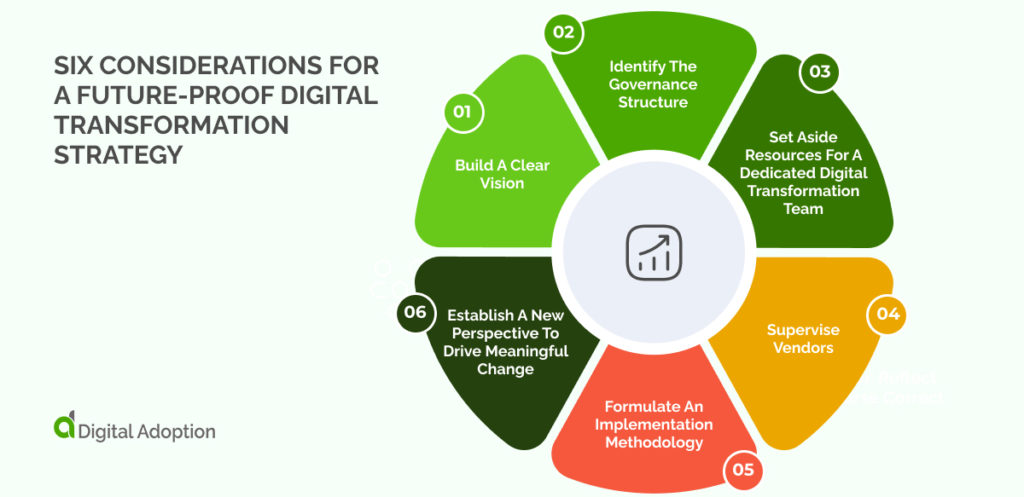Revolutionizing Business: Key Digital Transformation Strategies


Revolutionizing Business: Key Digital Transformation Strategies
In the rapidly evolving landscape of business, digital transformation has become imperative for organizations to stay competitive. Let’s delve into key strategies that can propel businesses towards a successful digital transformation.
Assessment of Current State
Before embarking on a digital transformation journey, a thorough assessment of the current state of operations is crucial. This includes evaluating existing technologies, processes, and organizational culture. Understanding the strengths and weaknesses provides a solid foundation for crafting an effective digital transformation roadmap.
Clear Definition of Objectives
Digital transformation is not a one-size-fits-all process. Organizations must define clear and specific objectives for their transformation efforts. Whether it’s improving customer experience, enhancing operational efficiency, or innovating products and services, a well-defined set of objectives guides decision-making throughout the transformation journey.
Cultivating a Digital Culture
Digital transformation goes beyond technology; it requires a cultural shift within the organization. Fostering a digital culture involves encouraging innovation, embracing change, and promoting a mindset of continuous learning. Employees need to feel empowered to adapt to new technologies and contribute ideas that drive digital innovation.
Investment in Cutting-Edge Technologies
A successful digital transformation strategy involves investing in cutting-edge technologies that align with organizational goals. Technologies such as artificial intelligence, machine learning, and the Internet of Things can streamline processes, automate tasks, and provide valuable insights. Strategic investments ensure that the organization stays ahead in a digitally competitive landscape.
To learn more about effective digital transformation strategies and their impact on businesses, visit Digital transformation strategies for in-depth insights and practical guidance.
Data-Driven Decision-Making
Data is a powerful asset in the digital era. Leveraging data analytics for informed decision-making is a cornerstone of successful digital transformation. Implementing robust analytics tools allows organizations to derive meaningful insights, identify patterns, and make data-driven decisions that drive efficiency and innovation.
Agile and Iterative Approach
Digital transformation is not a one-time project; it’s an ongoing journey. Adopting an agile and iterative approach allows organizations to respond quickly to changing market dynamics and evolving technologies. This flexibility enables continuous improvement, ensuring that the organization remains adaptive and resilient in the face of digital disruptions.
Cross-Functional Collaboration
Silos can hinder the progress of digital transformation. Effective collaboration across different departments is essential for a seamless integration of digital initiatives. Breaking down silos fosters communication, encourages knowledge sharing, and ensures that all parts of the organization work cohesively towards common digital objectives.
Customer-Centric Focus
Digital transformation should prioritize enhancing the customer experience. Understanding customer needs and expectations is key to developing digital solutions that resonate with the target audience. A customer-centric approach ensures that digital initiatives align with market demands, leading to increased customer satisfaction and loyalty.
Cybersecurity Integration
As digital initiatives expand, so does the need for robust cybersecurity measures. Integrating cybersecurity into the fabric of digital transformation strategies is vital to safeguard sensitive data and maintain the trust of customers and stakeholders. Proactive cybersecurity measures should be an integral part of every digital transformation plan.
Measuring and Adapting
Measuring the success of digital transformation initiatives is essential for refining strategies. Key performance indicators (KPIs) should be established to assess the impact of digital initiatives on business goals. Regular assessments and feedback loops allow organizations to adapt their strategies, ensuring that they remain aligned with evolving business landscapes.
Conclusion
Digital transformation is not merely a trend; it’s a fundamental shift in how businesses operate and innovate. Organizations that strategically embrace digital transformation can revolutionize their operations, enhance competitiveness, and stay resilient in an ever-changing business environment. By incorporating these key strategies, businesses can navigate the complexities of digital transformation and emerge as leaders in their industries.





